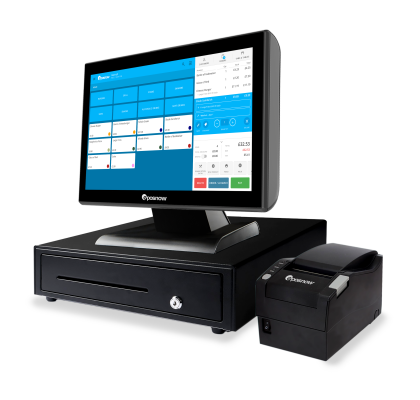How to Write a Retail Business Plan
When it comes to opening a retail store, there are a lot of things you need to take into consideration, so it's important to have a clear and concise course of action or a business plan.
While a retail business plan is basically a roadmap that clearly outlines your entire business strategy from start to finish, it can be a less than clear process to create one.
This guide includes everything you need to know about writing a retail business plan, including when to write it, what to include and examples.
Why do you need a business plan?
A business plan is essential for any new business, as it gives you a clear direction and helps to keep you on track. It's also a valuable tool for attracting investors, as it shows them that you’ve put thought into your venture and that you are serious about making it a success.
When should you write a business plan?
The best time to write a business plan is before you actually start your business so that you have a clear idea of what you want to achieve and how you are going to go about it. If you plan to apply for a business loan, most lenders will expect a precise business plan as part of your application. It's also important to review and update your business plan regularly, especially as your business grows and changes.
Is organising your retail business sending you off the rails?
Using Epos Now's complete solution for retail, you can sync with over 100+ automating business apps to optimise overall efficiency.
Our powerful POS system is designed to handle and perfect all your business processes. From multichannel inventory management with automatic reordering to employee insights, payroll and so much more, with Epos Now you can spend more time focusing on the real root of your retail business - the customers.

What are the characteristics of a retail business plan?
A retail store business plan needs to include everything that a business plan for any other type of business would cover e.g. USP and staffing. However, there are a few key aspects that are particularly important for businesses in the retail sector. These include:
Clear description of your target market
This is particularly relevant to retailers as they need to have a good understanding of who their target market is in order to tailor their products and services accordingly.
Detailed analysis of your competitors
As competition is fierce in the retail sector, it's important to know who your main competitors are, what strategies they are using and how you can differentiate yourself from them - this will help you to stay ahead of the game.
Well-thought-out marketing strategy
Tailoring your marketing strategies to the retail sector is crucial, as there are a number of unique challenges that need to be considered, such as footfall, seasonality and competition.
Realistic financial forecast
Retail relies almost entirely on sales, so it's important to have a clear understanding of your finances and be realistic about what you can achieve. This also includes having a contingency plan in place in case things don't go as expected.
What is the retail business plan format?
Since the format of your business plan will depend on a number of factors, like the type of business you are running and the purpose of the proposition, there is no one-size-fits-all answer to this question. However, there are a few staple elements that should be featured in all retail business plans:
Executive summary
An executive summary is a brief overview of your business plan. It should include your business's main objectives, a summary of your target market, an overview of your competition, and your unique selling point (USP). This helps to focus the reader on the most important aspects of your plan.
You should consider summarising the overall business plan and fetching key points from it to ensure a proper executive summary. It's easy to handle this task by using an advanced summarise tool that will analyse the entire content and include the main aspect of your plan in the summary while keeping it concise.
Business description
This section should give a brief overview of your company's history, as well as its current structure. Your business description should also include your company's mission statement and any other relevant information about your products and services that would give readers a better understanding of your business.
 Market analysis
Market analysis
In this section, you need to provide a detailed description of your target market. This should include information on your customer's demographics, buying habits, and needs.
You should also include a competitive analysis to show how your business will stand out in the market.
Products and services
This section should provide a detailed description of the products and services you offer, as well as how they meet the needs of your target market. You should also include information on any new products or services that you plan to introduce in the future.
Sales and marketing strategy
In this section, you need to outline your plans for promoting and selling your products or services. This should include information on your pricing strategy, your promotional activities, and your distribution channels. You should also include a sales forecast to support your claims.
Financial projections
Your financial plan should include a detailed analysis of your business's current financial situation (including expenses budget and profit and loss statement), as well as your projections for the future. This section should also include a break-even analysis to show when your business will start to make a profit - which will be a particular point of interest for any investors you might approach.
Operational outline
Your operational plan should outline the day-to-day running of your business, as well as any plans you have for expansion. This section should include information on your business premises, your opening hours, your staff, and your stock.
Management and ownership
In this section, you will need to provide an overview of your management team, as well as your company's organizational ownership model. This helps readers to understand who is responsible for what within your business, and how exactly decisions are made.
Appendix
The appendix should include any additional information that would be useful for readers, such as your CV, market research data, or copies of important contracts.
What are some retail business plan examples?
While there are a number of different ways to layout your retail business plan, some of the most common examples include:
Traditional business plan
A traditional business plan is typically used for more established businesses and uses a more formal tone, alongside more detailed financial projections.
Lean business plan
This is a less formal, more concise type of business plan which is often used by startups or business owners that are less experienced. It contains the essential elements of a traditional business plan, but in a shorter, more to-the-point format.
One-page business plan
As the name suggests, a one-page business plan is a single page that outlines your business's key goals and objectives. This type of business plan can be particularly useful for businesses that are seeking funding, as it is easy to communicate your business's key points in a concise and impactful way.
However you choose to present your retail business plan, when it comes to the goals and targets you include, be sure to keep them achievable and realistic. It's important to have an idea of what you want your business to achieve, but if your goals are too lofty, you may end up setting yourself up for disappointment.
Retell the retail experience with a powerful POS system
Point of sale (POS) systems are the backbone of retail businesses for a number of reasons. Designed to work as a complete business management system, Epos Now allows you to control all aspects of your company from one cloud-based system.
- Review auto-generated profitability reports based on individual product performance, trending items, best and worst sellers.
- Multi-award-winning inventory management that syncs sales across multiple channels and ecommerce platforms.
- Customer management systems that save customer contact details and shopping preferences for more targeted marketing.
- Integrations with over 100 apps including marketing, accounting, bookkeeping, and loyalty program apps.
If you're still shopping around for business plan pointers, we'd love to hear from you!




